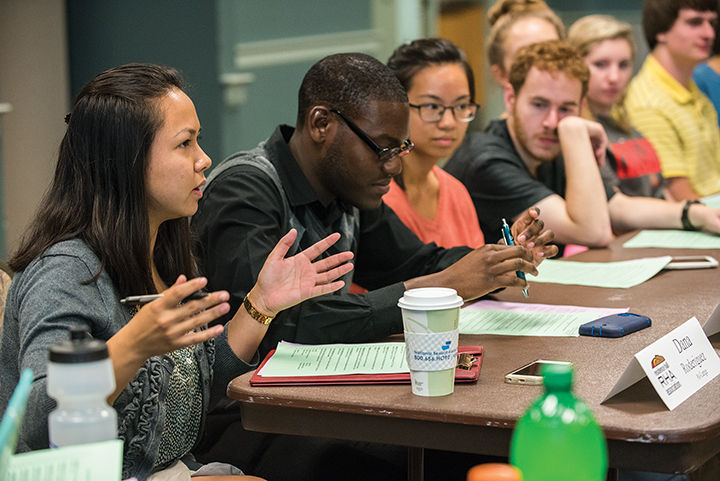As they wrapped up the fall’s final senate meeting on Dec. 1, Residence Hall Association members reflected on the semester’s unusually close community.
“Last semester, we didn’t have any bonding events or anything of that sort besides community dinners,” said Daniel Katz, a sophomore finance major. “I realized you need bonding and you need a community to keep you in it.”
This semester, RHA established a mentor program to pair older and younger senators together, Katz said. It also held outside bonding activities, including a spin class with University Recreation & Wellness — events that junior government and politics major Sasha Galbreath said are essential, given the number of underclassmen in the senate.
“In the past few years, the [Department of] Resident Life has been making more of a move to have more freshmen and sophomores on campus, so what I have been noticing is a greater presence of sophomores and freshmen in RHA,” Galbreath said.
READ MORE: RHA Senate votes to endorse security camera pilot program in dorms
One such freshman, criminology and criminal justice and government and politics major Darius Craig, became chair of the dining services committee and also successfully introduced a resolution to support a security camera pilot program in the dorms.
“I’ve really tried to increase the leadership, especially of our younger and new members,” RHA President Allison Peters said. “Darius is an example of how we’ve done that. … He’s so passionate, and it’s inspirational to see.”
Craig has bold ideas for the future of RHA, which he said has grown to be an integral part of his on-campus involvement.
He said he hopes to pass resolutions in the coming semester to support the new dining plan and to consider reviewing the current drug policy in dorms. Not being able to get to these in the fall was a minor frustration, Craig said.
“It sucks, but there is a process for everything,” Craig said. “We have to understand that RHA is a big organization and we have a lot to do.”
Both Craig and Galbreath want to improve RHA’s presence with the rest of the student body. Galbreath said she has observed “a lot of apathy” from the student body regarding on-campus issues RHA deals with.
READ MORE: UMD RHA urges mandatory in-person sexual assault prevention training
“I don’t think everyone knows who their representatives are and who they can talk to,” Craig said. “This is something our local councils need to start working on. You’re serving the residents; it’s your obligation and your priority to go to your residents and have them understand you are the one speaking for them.”
Peters said she believes RHA-sponsored programs such as the Welcome to the B1G Show Athletic Kickoff have helped spread RHA’s name to the younger students.
“While there are still some upperclassmen that don’t know what RHA is,” Peters said, “in a few years, once this new tradition has been the standard, everyone will know what RHA is and what we strive to do.”
While RHA might not pass or consider as many resolutions that directly oppose university administration, this is a product of RHA’s cooperative nature with the various departments, Peters said.
READ MORE: RHA sets agenda for semester, reinstates constitutional committee
This semester, major RHA resolutions included supporting a security camera pilot program for dorms and urging the university to mandate in-person sexual assault prevention training.
“Comparing us to other organizations on campus that might have a huge impact on students and people are passionate about — we don’t do that,” Peters said. “But we have our place and we know what we want to do. We work on a ground level to make sure students’ voices are heard in departments and administration.”



